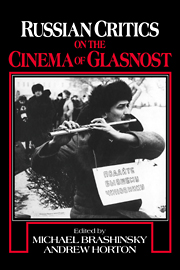Introduction
Published online by Cambridge University Press: 04 August 2010
Summary
In 1978, long before this anthology (or, for that matter, glasnost itself) was conceived, a book titled America on the Screen appeared briefly on the Moscow bookstands. Published during the cultural vacuum of Brezhnev's stagnation, that book – a collection of American film reviews from the 1970s, reprinted (who knows if legally) from every major U.S. publication – was unprecedented and extraordinary. The movies critiqued in the book, The Godfather, Cabaret, M.A.S.H., The Exorcist, Scarecrow, and Catch-22, among others, had never been seen (some were never even heard of) by Soviet audiences. Remarkably, it was not the films nor the film makers but the critics – Andrew Sarris, Richard Schickel, Rex Reed, and others – who became heralds of the American screen and, more remarkably, of the American culture and America itself to people who were not allowed to know. If Pauline Kael was feared on the Hudson, she was indeed trusted on the Moscow River.
Since then, the world has turned 180 degrees. Pauline Kael has retired. The USSR is no more. The country, its communist regime, its unelected leaders, and its old names have all ceased to exist. Yet one of the few things that remains unchanged is the unenlightenment of the two cultures about each other. This collection, limited to the cinema of glasnost and the last years of the Soviet Union, is intended to fill one gap. Once again, the film critics lead the way.
We have documented in The Zero Hour: Glasnost and Soviet Cinema in Transition (Princeton University Press, 1992) how important cinema was to the Gorbachev period of restructuring, from 1985 to 1991, the year the Soviet Union finally dissolved.
- Type
- Chapter
- Information
- Russian Critics on the Cinema of Glasnost , pp. 1 - 8Publisher: Cambridge University PressPrint publication year: 1994

